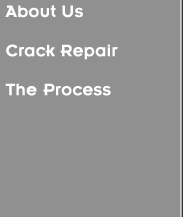


|
Professionals agree that poured concrete foundation walls crack. They also agree that all cracks in foundation walls are caused by stress. But they don't agree on what to do about these cracks. As long as concrete has been used in foundation walls, the question regarding crack repair has been hotly debated. One side of the issue suggests that cracks shouldn't be repaired unless they are moving. However, concrete moves as the temperature changes. Therefore, all cracks move every day. Side two advocates repairing cracks only when they are leaking. However, some cracks are wide enough to allow the infiltration of dirt and critters but do not leak. It does seem appropriate that these cracks be repaired before they begin to leak and/or become a problem. The third side of the repair or not to repair issue takes the position that all cracks are defects in the wall and must be repaired to ensure that the foundation wall performs as designed.
Concrete professionals know that unless the material used fills the crack cavity completely, including the portion of the crack below the floor, it can't be considered a permanent repair solution. The only materials capable of completely penetrating a concrete foundation wall crack are epoxy and urethanes. These materials can be injected into the crack cavity mechanically or by hand. The method used depends on the individual job characteristics. Permanently repairing foundation wall cracks by injection is not a complicated procedure. However, it does require construction knowledge and patience which is not always found in the every day construction environment. Poured concrete foundations are fixable, eliminating the need for installation of expensive French drains or sump pumps.
|


 THREE ARGUMENTS OF CRACK REPAIR
THREE ARGUMENTS OF CRACK REPAIR